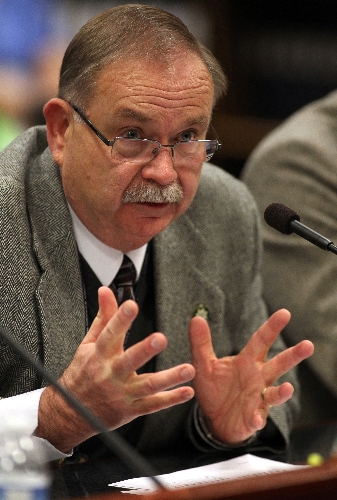Sandoval wants counties to pay for pre-sentence reports
CARSON CITY -- Gov. Brian Sandoval has backed off an earlier proposal to make counties responsible for conducting pre-sentence reports used by judges when sentencing criminals, and instead he will seek payment from the local jurisdictions for the services, a legislative panel learned Thursday.
Chris Perry, acting director of the Department of Public Safety, and Bernie Curtis, head of the Division of Parole and Probation, said they were told of the administration's change last week.
"This is new to us. We got this last Friday," Perry told a joint Assembly Ways and Means and Senate Finance subcommittee.
Sandoval's initial budget called for eliminating 77 positions related to pre-sentence reports for a savings of
$10.4 million over the next biennium.
Andrew Clinger, administration and budget director, said later that under the new plan, investigators with parole and probation would continue to produce the reports. "However we would change the funding formula from the state general fund to county funds."
A bill draft imposing the change was submitted last week.
But the news raised concerns from lawmakers.
"Have you discussed this with rural counties?" asked Sen. Dean Rhoads, R-Tuscarora, whose district includes seven rural counties and a part of another. "Several rural counties out there are ready to go bankrupt."
"We have not," Curtis responded. "We will certainly discuss these issues when we are authorized to do that."
Pre-sentence investigations are conducted on anyone who has pleaded guilty or is convicted of a felony. The reports detail an offender's past, family relations, education and criminal history. They are used by judges as a guide in sentencing, prisons and parole and probation officers.
Washoe District Judge Brent Adams told the committee that the reports are essential.
"Judges must know ... must be guided by insight about the risk for public safety," he said. "It's irrational and impossible to sentence otherwise."
Likewise, when parole officers "go knock on a door in the middle of the night, they need to know who's on the other side," he said.
Sen. Sheila Leslie, D-Reno, said she was glad the administration had a change of heart.
"But I'm not sure billing the counties is the way to do it," she said.
Curtis said under the budget proposal, 45 positions are still slated for elimination. Most have been left vacant, and no layoffs are anticipated. Caseload ratios will jump from 70 to 80 offenders per officer. About 1,700 offenders deemed to be low risk would be placed in "administrative banks," where supervision is minimal, generally with no home visits.






















